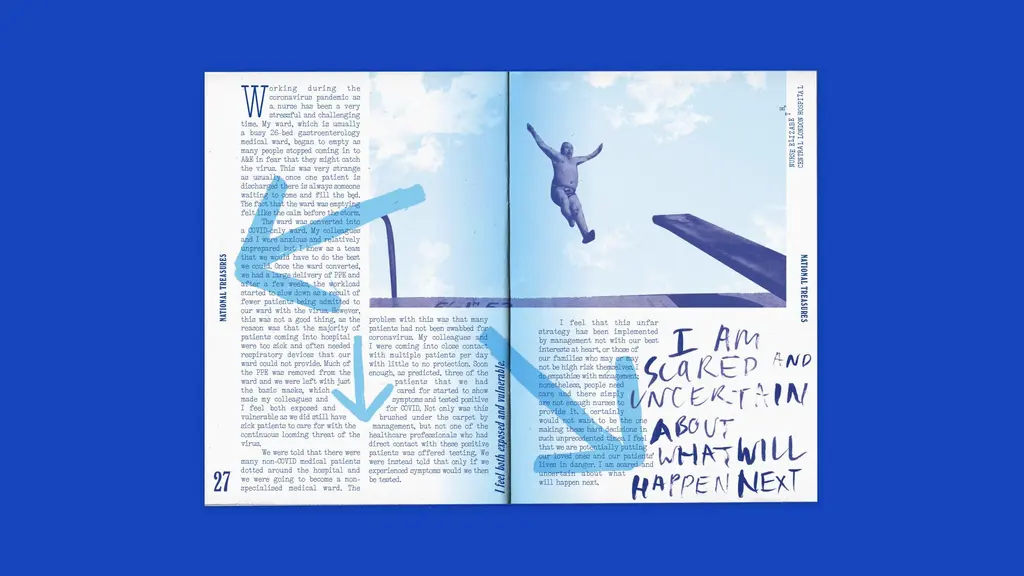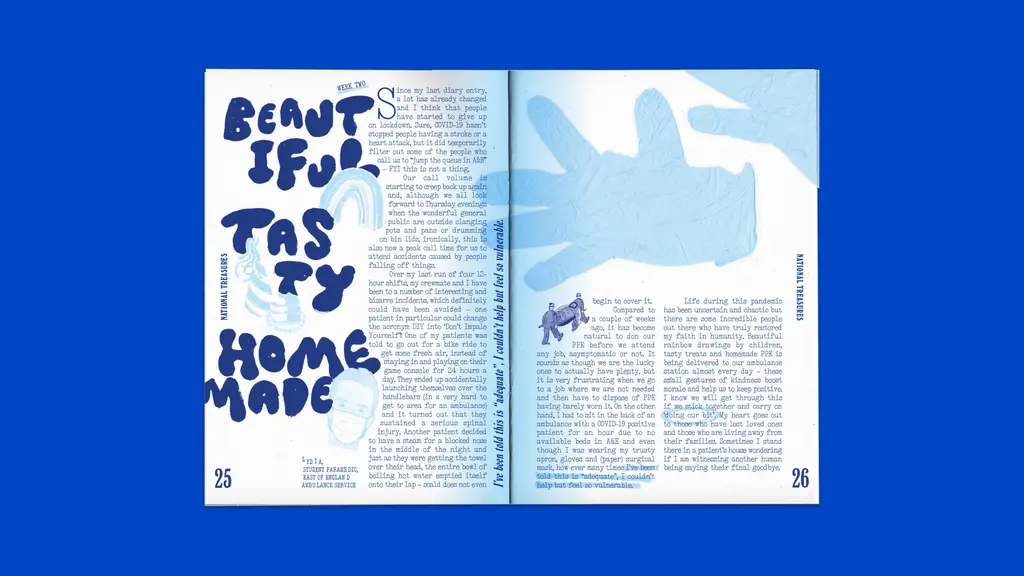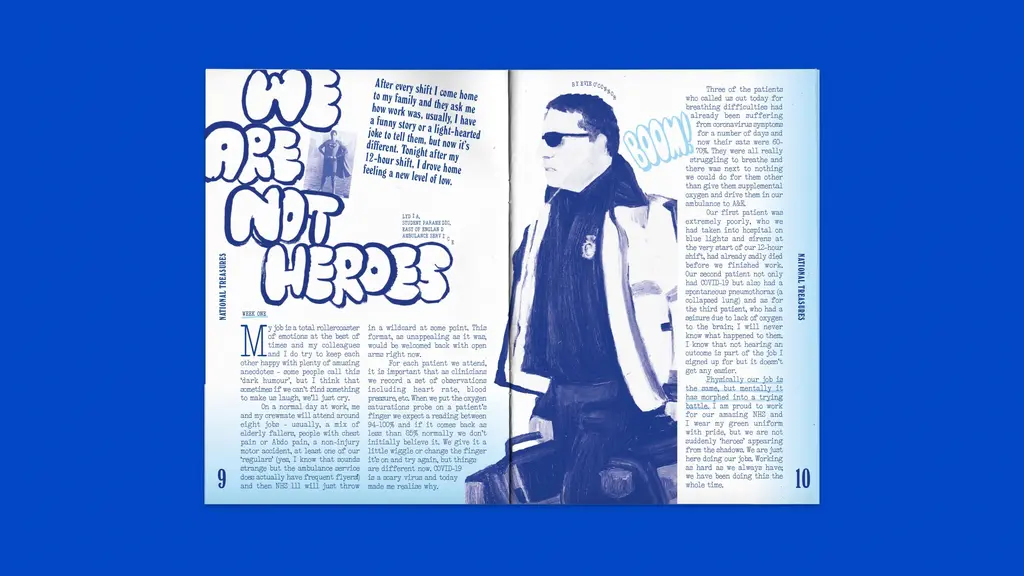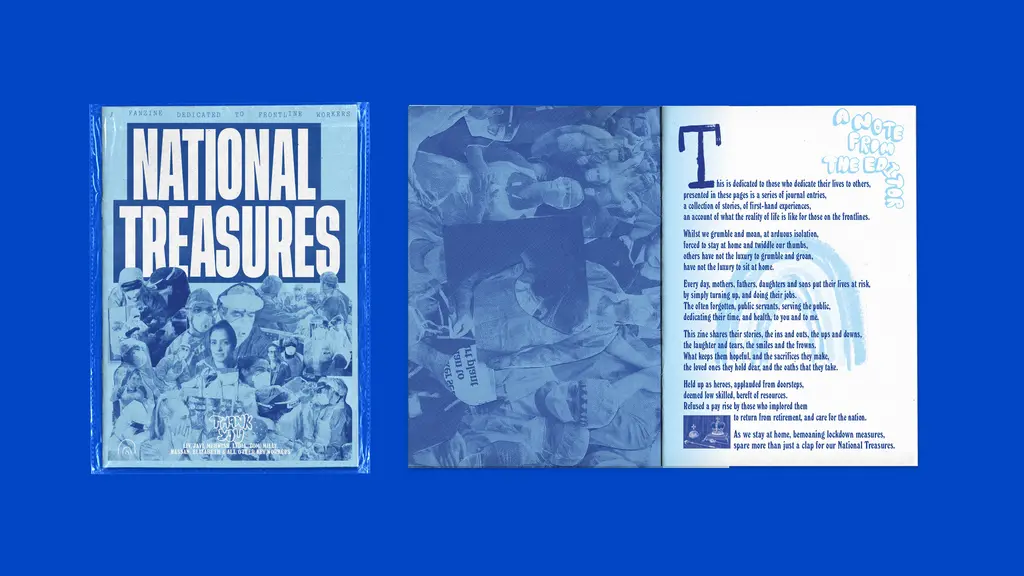National Treasures: the NHS in their own words
Between Borders’ latest project is a moving collection of journal entries detailing life on the frontline.
Culture
Words: Jade Wickes
As the weeks in lockdown continue to tick by, one thing in particular has emerged from the pandemic-induced chaos: increased respect and admiration for frontline workers and healthcare professionals who have been putting their lives at risk, daily, to ensure our safety.
To pay tribute to the sacrifices made by NHS workers, contemporary British culture magazine Between Borders has created National Treasures – a zine which expresses the reality of the frontline through moving journal entries from charge nurses, student paramedics, and hospital cleaners (to name a few).
Founded in 2018 by Luc Hinson and Tom Shotton, Between Borders was born out of frustration with right-wing monopolisation of British identity. Giving communities a platform and unpacking what it means to be British today are both values at the core of the magazine – it made sense to develop National Treasures as a continuation of that.
Inspired by the DIY spirit of ‘70s punk fanzines, this project was put together in a matter of weeks. “It was a collaborative project from start to finish,” says Hinson, who brought in artists Inti Bint and Evie O’Connor and photographers James Starkey and Hassan Akkad to help illustrate it.
For Hinson, it was crucial that the zine reflect a range of voices and experiences. “As a publication, that’s our duty year-round,” he says. “Our work has always been centred around platforming the experiences of others and allowing them to speak for themselves.”




How did the creation of National Treasures come about?
It originated from a place close to my heart – both my parents were nurses and for that reason I really wanted to investigate and find out how the pandemic was affecting healthcare workers. I felt there was a cognitive dissonance between clapping for the NHS on a Thursday and not knowing or understanding how life has changed for those on the frontline.
It’s a project for us that also served as a catharsis for the healthcare professionals who contributed. It provided them a means to vent, share and reflect on how their working situation has changed, to explore the impact it has taken on them both physically and mentally.
How did you go about selecting which key workers would write for the zine?
It started off through our community – I’m a very strong believer in the six degrees of separation. I reached out to peers of mine and colleagues of my parents who I knew were working for the NHS, to spark an initial conversation about how they were feeling, and what was keeping them hopeful. From there we used our wider community and online presence to source the remaining contributors.
Are there any stories you found particularly poignant?
Every single entry moves me. When there is a constant barrage of information about the pandemic emanating from every news source, raw statistics and reporting remove the human experience from the equation. Reading these NHS workers reflect on their shifts was sometimes heartbreaking, but above all these people are just like you and me. They have loved ones and families, but are simply carrying on – putting on their uniforms and doing their jobs.
Have you learned anything new about the situations that NHS workers are thrust into day-to-day?
As a public health service that’s been decimated by ten years of austerity, I think the NHS is often only viewed as a collective organisation. What working on this zine has shown me is that it truly is the sum of its parts – it’s made up of millions of selfless individuals who sacrifice their safety every day, whether there’s a pandemic raging or not. I just hope this newfound national pride and appreciation for the NHS translates into adequate funding and rights for the migrant workers who don NHS uniforms every day.
Have you thought about tackling how coronavirus has affected certain communities in the next issue of Between Borders?
Back in December, we decided the theme of Issue 002 would be Closure – exploring how the void of Britain’s industrial collapse has affected communities and individuals left behind. The pandemic has further impacted these societal fault lines and forced many businesses, organisations and community hubs to close their doors. This gives Closure a second meaning, and we’ll be using the upcoming issue as a way to document the pandemic’s impact on society.
All profits from the sale of National Treasures will be donated to NHS Charities Together. The zine is available to purchase here





